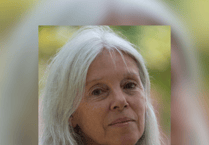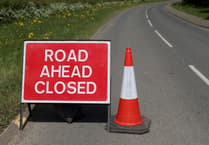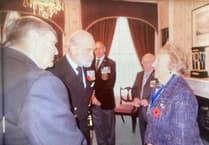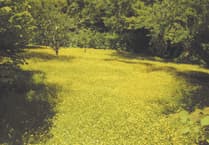Days before Holocaust Memorial Day 2019, members of the South Hams Jewish community have expressed their worry that “something like this could happen again”.
Sunday, January 27, is Holocaust Memorial Day, an international day to remember the six million Jews murdered during the Holocaust, the millions of people killed under Nazi persecution and countless people lost in subsequent genocides in Cambodia, Rwanda, Bosnia and Darfur.
On this date in 1945, the Soviet army entered Auschwitz and liberated more than 7,000 prisoners who were mostly ill and dying. This year marks the 25th anniversary of the genocide in Rwanda and the 40th anniversary of the Cambodian genocide. All around the world people will come together to remember, to mourn and to seek to learn the lessons of the past.
With the Brexit debate raging and a growing mistrust of racial, political and cultural differences all around the world, talking about discrimination, racism and hatred feels more pertinent than ever.
Marc Frank of the Totnes Jewish Community said: “Holocaust Memorial Day has relevance for all of humanity. It is vitally important that we do not forget what happened and that we learn from the past.
“With what is happening around the world at the moment, here in the UK with Brexit and the treatment of immigrants and in the US under the Trump administration, the themes are very current.
“We are seeing the rise of the right in countries that we might not expect and there is a possibility that something like this could happen again if we are not fully aware of the dangers.”
Mark described the Holocaust as “a scar on the Jewish psyche” and said that Holocaust Memorial Day is an opportunity to grieve and mourn for those who were lost but also to reflect on the lessons.
He said: “It is not just about what happened to six million Jews in the Nazi concentration camps, but all genocides that have taken place since that time. We have a collective grief for all who have been victims of persecution and genocide.”
A Totnes artist of Hungarian Jewish descent who lost many family members in the Nazi death camps, shared some of her thoughts and feelings. We have kept her identity secret out of respect for her family who do not wish to be identified and will refer to her as Naomi.
Naomi said: “My great grandmother died in Auschwitz holding her one and a half year old granddaughter. I am very close to my uncle, who still lives in Hungary, and it was his baby sister who died.
“When I look at the photographs of them, particularly the children, and I look at my own children it changes my whole perspective of history and politics, it makes it real and very personal.”
Naomi, who is a political artist and taught for a short time at the Jewish Cultural Centre in London, says she has never been able to feature Hitler in her work because it feels “too close to home”.
She recalls having a swastika painted on her desk while she was at school and having to leave the room when they were shown documentary footage of Auschwitz during her time at film school because she went into shock at the thought that her relatives might be among the piles of bodies.
She said: “The prejudice still hasn’t completely gone away and the fear that the Jews may be persecuted again has been a part of my upbringing. I hate the idea of Brexit and everything it represents. I was made in Hungary but born here.
“We are lucky in Totnes that this is a more tolerant and accepting culture than in some other places and this enables me to feel optimistic about the future.”
Mark, who is part of the Exeter-based Muslim Jewish Friendship Group, said there is “a lot of fear among minority groups” and also a sense of solidarity. He said: “Nationalistic sentiment is rising around the world and we have seen where this can go. It is important to raise awareness and to stand together.”
Unlike Naomi, Mark is not aware of direct family members who were affected by the Holocaust, however he said that whenever there is an anti-semitic attack anywhere around the world, “waves of trauma” are felt throughout the entire Jewish community.
The theme for this year’s Holocaust Memorial Day is Torn From Home. The idea is for people to reflect on what it means to lose the safe place we call home in the face of persecution.
In Totnes, Elie Fruchter is presenting a Holocaust Memorial Concert on Saturday January 26 at St Mary’s Church from 11am to 12noon (doors open at 10.30am). There will be piano works by Bach, Dandrieu and Froberger and poetry readings by Jane Spiro including original compositions by Suzanne Munro. Entry is £5 with a retiring collection in aid of The Holocaust Educational Trust.
At 7.30pm on the same day at Buckfast Abbey, South Brent Singers ill join with the Buckfast Abbey choristers to perform Philip Arkwright’s Holocaust Cantata, Shoah. Tickets cost £10 and all profits will be donated to the Holocaust Education Trust. Available from www.buckfast.org.uk/boxoffice
There will also be a Holocaust and genocide exhibition at The Guildhall, High Street, Exeter on Sunday, January 27, and Monday, January 28, and an opening ceremony at Exeter Cathedral on Monday, 28 January, at 10am attended by the Lord Mayor of Exeter, the chairman of Devon County Council and the Dean of Exeter Cathedral.
The Holocaust Memorial Day Trust wanted the theme of ‘Torn from Home’ to “reflect how the enforced loss of a safe place to call ‘home’ is part of the trauma faced by anyone experiencing persecution and genocide”.
Their website states: “‘Home’ usually means a place of safety, comfort and security. On HMD 2019 we will reflect on what happens when individuals, families and communities are driven out of, or wrenched from their homes, because of persecution or the threat of genocide, alongside the continuing difficulties survivors face as they try to find and build new homes when the genocide is over.”
Gary Streeter MP said: “I have been struck by the account of Holocaust survivor Lilly Appelbaum Malnik who recalled how the guards at the camp stated that ‘From now on you do not answer by your name. Your name is your number.’
Indeed she reflected that ‘I felt like I was not a human person anymore’. The Holocaust was not created in a day, but its foundations were resting upon a prejudice which was voraciously spread by the Nazis. This prejudice spread because of lack of contact with and fear of the nameless ‘other’.
“It is easy to hate someone who you have never met and to begin to think of them in less than human terms. That is why it is so important to remember the Holocaust and endeavour to ensure that hatred akin to what spread across Europe eight decades ago never surfaces again.
“I commend the various events happening in Plymouth and elsewhere this weekend which will mark Holocaust Memorial Day. While we must never forget, we must also never let this happen again.”





Comments
This article has no comments yet. Be the first to leave a comment.